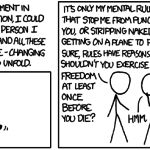We run our website the way we wished the whole internet worked: we provide high quality original content with no ads. We are funded solely by your direct support. Please consider supporting this project.

The Risk of Love
The most basic and yet most profound teaching of the Bible is that “God is love” (1 Jn 4:8; 16). He is revealed to be a God who is triune—Father, Son and Holy Spirit (See Mt 3:16; 28:19, Jn 14:26; 15:26)—who’s very essence is an eternal, loving relationship. He created the world out of love and for the purpose of expanding his love.
God the Father desires that we dwell in Christ and Christ dwell in us, just as Christ dwells in the Father and he in Christ (John 17:21-26). The Father wants us to participate in and reflect the loving union that he has with Christ. The goal, in other words, is for the perfect triune love of God to be manifested to people, replicated in people and reflected back from people. This is why God created the world. The whole of creation is meant to express and embody the eternal triune love that God is. It exists to glorify God.
Humans are to glorify God by expressing his love and authority as we rule the earth. God wants to be Lord over all creation, but because he is the triune God of love, he doesn’t want to do this unilaterally. Of course he could have created a world where we have to do his will, but it would have been a creation devoid of love. Instead, God wants to rule creation through coregents, free agents who through love apply his sovereign will to the earth. God therefore created us “in his image” that we might “have dominion” and “subdue” the earth (Gen 1:26-28).
In such a world, there is risk because love must be chosen. Unless people can choose not to love, they can’t genuinely choose to love. The possibility of the one is built into the possibility of the other. Love simply cannot be coerced or programmed into people.
A creation in which love is the goal must incorporate risk. Creation doesn’t have to have actual evil, but it must allow for the possibility of evil—if the possibility of genuine love is to exist.
This is why God commanded humans to have dominion over the world in the creation story. If we weren’t free to disobey God, a command would be unnecessary; we would do what God created us to do automatically. Because God wants his will carried out in love, he empowers humans to carry out his command freely. And this, of course, means we can refuse to carry out his command if we choose.
God gave Adam and Eve free will in the Garden. The purpose of this freedom was that they might choose to remain in loving union with God. But because it was a union of love, it had to be possible for Adam and Eve to reject it. Tragically, the first couple chose to disobey God, thereby bringing judgment on themselves and their descendants (Gen 3:1-19). This disobedience was not part of God’s original plan; it was a rejection of God’s plan. Yet the possibility of this rejection had to exist if God’s original plan was to be possible. His plan is for people to administrate his creation as they receive, replicate and reflect back God’s triune love.
—Adapted from Is God to Blame?, pages 62-65
Related Reading

Knowing the Eternal God
If all our knowledge about God is to be oriented around the cross, as I argue in many places (see this post for instance), what does this mean for how we reflect on God’s transcendence? In other words, how can we speak of God’s eternal being since there obviously was no cross within God prior…

Did the Fall Really Happen? (podcast)
Greg speculates on the nature of the fall, then talks about evidence of God in the universe. Episode 520 http://traffic.libsyn.com/askgregboyd/Episode_0520.mp3

Are You Fully Alive? Here’s the Key
Image by rashdada via flickr. The cross reveals the full truth about us. This truth reconnects us with our true source of life, which in turn heals our idol addictions. This dimension of the cross is frankly so breathtakingly beautiful that, so far as I can tell, very few followers of Jesus have ever really grasped it.…

Crucified Transcendence
If our thinking about God is to be faithful to the New Testament, then all of our thinking about God must, from beginning to end, be centered on Christ. I’m persuaded that even our thinking about God in his transcendent, eternal state should begin and proceed with the Pauline conviction that we know nothing “except…


